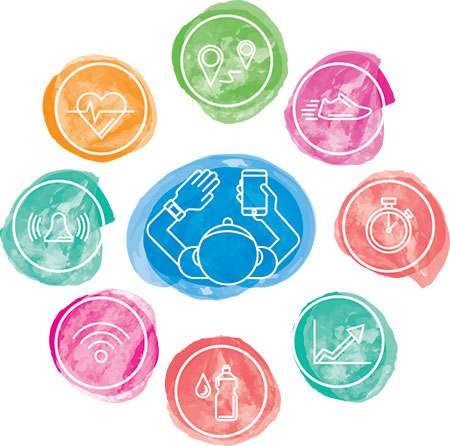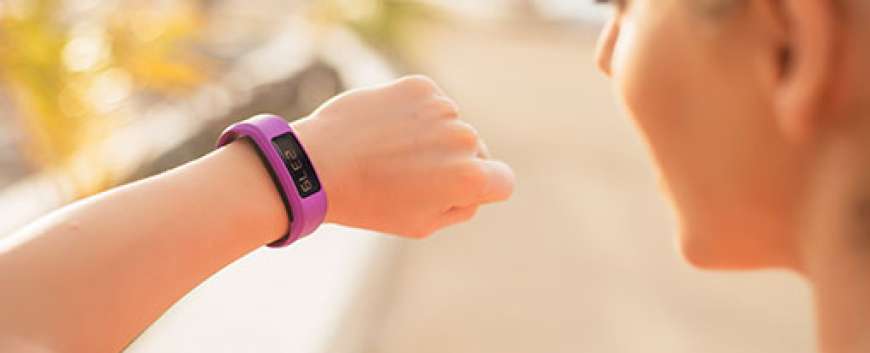Signal Processing’s Impact on Wearable Technology in Healthcare Monitoring
Top Reasons to Join SPS Today!
1. IEEE Signal Processing Magazine
2. Signal Processing Digital Library*
3. Inside Signal Processing Newsletter
4. SPS Resource Center
5. Career advancement & recognition
6. Discounts on conferences and publications
7. Professional networking
8. Communities for students, young professionals, and women
9. Volunteer opportunities
10. Coming soon! PDH/CEU credits
Click here to learn more.
Signal Processing’s Impact on Wearable Technology in Healthcare Monitoring
Wearable sensor technology has improved substantially in recent years – and the personalized healthcare movement is reaping the benefits. Specifically, advancements in miniaturization, smart materials, low-power consumption and ruggedness have transformed ubiquitous monitoring. Monitoring vital physiological parameters including body temperature, heart rate, blood pressure, sugar level, and oxygen saturation in blood is now standard – and affordable. Today’s increasingly compact, wearable designs incorporate and leverage numerous sensors: accelerometers, SpO2, (an estimate of oxygen saturation in the blood), heart/pulse rate, electrocardiography (ECG), and electroencephalography (EEG), among them. Signal processing plays a significant role too; techniques applied on the acquired sensor data – real-time and off-line – continue to enhance the value, and progress, of healthcare monitoring, which is crucial for use by the public. 
Take recent upgrades in the structure of wireless body sensor networks (WBANs), for example. One of the major challenges associated with WBANs is the motion artifacts that get captured with the signal of interest – such as ECG or EEG. Signal processing techniques based on recursive principal component analysis (RPCA), independent component analysis (ICA), discrete wavelet transform (DWT), and adaptive filter have been applied on the ECG signals for removing motion artifacts.
An estimate of the motion artifacts is obtained using the stationary wavelet transformation. An automatic multi-resolution thresholding scheme, which uses a robustified QRS detection is proposed. An optimal adaptive filter using empirical mode decomposition (EMD) is proposed for motion artifact removal. Activity classification is another application where signal processing has effectively been used. Body movement activities (BMA) recognition from ECG signals using PCA and hidden Markov models (HMM), Gabor filters and artificial neural networks (ANN), support vector machines (SVM), time domain statistical features, and frequency domain features have been implemented.
Many wearable, real-time healthcare monitoring systems have been developed for detecting cardiac abnormalities (bradycardia, tachycardia and sinus arrhythmia) using Android mobile; sudden fall detection, emotion classifier, Bayesian network classifier based normal, Premature Atrial Contraction (PAC), Premature Ventricular Contraction (PVC) and Myocardial Infarction (MI). As wearable sensor technology continues to advance, we expect to see consistent improvement in personalized healthcare. And, as wearable technology becomes more common, individuals can benefit from monitoring their own health daily, and signal processing techniques are the brain behind it.
About the Author:
Dr. Rahul Kher received a B.E. (Electronics) from Sardar Patel University in 1997, an M.Tech (Electrical Engineering) from the Indian Institute of Technology, Roorkee in 2006 and a Ph.D. (Electronics & Communication Engineering) from Sardar Patel University in 2014. He has teaching and research experience of over 18 years. His research interests include Biomedical Signal and Image Processing, Medical image analysis and Healthcare monitoring systems. He has published four books and more than 60 research papers in various international journals and conferences. He is a Senior Member of IEEE and was the founding secretary of the Signal Processing Society (SPS) Chapter of IEEE Gujarat Section from 2013-2015.
SPS Social Media
- IEEE SPS Facebook Page https://www.facebook.com/ieeeSPS
- IEEE SPS X Page https://x.com/IEEEsps
- IEEE SPS Instagram Page https://www.instagram.com/ieeesps/?hl=en
- IEEE SPS LinkedIn Page https://www.linkedin.com/company/ieeesps/
- IEEE SPS YouTube Channel https://www.youtube.com/ieeeSPS











